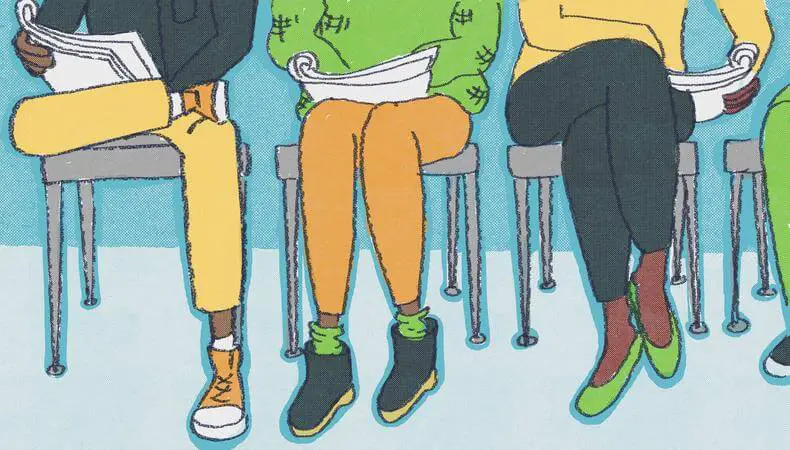
What to expect in an audition, and a few tips for actors
Auditions really are a nerve-wracking and difficult experience for most actors, but they are a vital area of the job. Here’s how an audition process works and several tips on how best to perform your absolute best facing the casting director or producer.
Getting the Audition
For most roles, you (or your agent) must submit a photo and resume to whoever is casting the production. Occasionally, you could hear about an “open call” where anyone may arrive at the audition. These types of auditions are often called “cattle calls” because hundreds of people arrive and are quickly herded through. However, most auditions are invitation only.
In case you are called for an audition, you’ll often receive “sides”, which are simply just a couple of pages of the script that you will be anticipated to read. In theater, you may also or instead be anticipated to really have a monologue and/or musical number prepared. Either way, after you have a script at hand, it’s time to get down to business.
Preparing for the Part
Read the script. Study it. Find each detail about the character you will audition for. Lines aren’t important yet… just give attention to who the character is. How old is she? Where’s she from? How does she experience another character in the story?
After you know everything there is to know about the character, then it’s time to learn your lines. Use whatever technique is most effective for you. Although you shouldn’t be likely to know all of your lines at the audition, it’s safer to be safe than sorry.
Before the Audition
When dressing for an audition, it’s far better to dress in accordance with the sort of character you’re testing out for. For instance, if auditioning for the role of a cowboy, you wouldn’t want to wear a small business suit or old shorts and a sweatshirt. On the other hand, there isn’t to go out and rent chaps and spurs. Just dress to imply the part, perhaps in casual jeans and boots.
exercises
You need to loosen up for an audition just as an athlete warms up for competition. Execute a few stretches and vocal exercises and take one more chance to review your lines. Then relax. It’s very easy to get overly nervous before an audition, and that nervousness will show.
When you arrive at the audition and register, you’ll probably have time and energy to wait for a couple of minutes until it’s your turn to read. There will be other actors waiting with you, but it’s far better to steer clear of the temptation to talk and gossip with them. Stay focused… you can always socialize later.
Reading for the Casting Director
The Casting Director is the one who you will probably be auditioning for. Depending on how busy he or she is, the CD might take a couple of minutes to speak with you or might say “hello” and ask you to begin.
Now’s your responsibility to shine. Forget that it’s an audition and do the scene as you would in the specific production. Keep your energy up and tell yourself that you’re this character. And remember that the Casting Director isn’t your enemy. They desire you to be the best person for the role because it shows that their job is done.
Here are a few things to avoid when performing for or speaking with the Casting Director.
Don’t suck up. Casting Directors appreciate compliments as much as anyone, but they’ll know when you’re just butt-kissing and will probably be very annoyed by it.
- Never touch the Casting Director. Aside from a friendly handshake, it’s best to avoid physical contact. If the scene calls for you to kiss or hit someone, just mime it.
- Don’t wreck the office. As stupid as it sounds, some overzealous actors will throw or break things during a scene. If you do this, the CD will remember your performance, but not in a good way.
After you finish your reading, the Casting Director will thank you and maybe give a couple of comments. Then it’s time to move on. Don’t waste time worrying or criticizing your own performance. I just look forward to the next one…
Callbacks
If the Casting Director likes your performance, you will undoubtedly be given another audition, a “callback “.only at this audition, you will see fewer actors trying for the role. There may also be more people there to see your performance, usually the Director of the production and possibly Producers, Writers, or studio executives.
You must wear the same clothing to the callback as you did to the first audition. Also, you need to accomplish the same performance as you did the first time. Whatever you did, the CD liked it. Don’t blow your chances by second-guessing yourself and trying something different.
However, even when everybody loves your reading, they might ask you to ” try it another way”. This doesn’t imply that they didn’t like your performance. They should just observe how well you may take direction.
Treat a callback like any other audition. Do your best, then go home and forget about it. Either you’ll receive the job, you’ll receive another callback, or they will go with someone else.
Keep Records.
Whether or not you get the part, or possibly a callback, keep an archive of when and where you went along to the audition, the Casting Director’s name, that which you wore, and every other information that could be important.
Film and theater auditioning, like every other performance, requires careful planning and preparation. It is, therefore, necessary for every aspiring actor to be ready for their audition. As the old saying goes, failing to prepare is preparing to fail.
Before you attend your very first acting audition, have a strong understanding of the auditioning process and what’s expected of you when you arrive at your first audition. The following tips will make auditioning much easier for you. They are meant to give you some background on what you may face during your audition.
The Audition Fundamentals
- Be courteous.
- Arrive on time.
- Have a neat appearance.
- Be prepared.
- Have a professional attitude
What is an acting audition? It’s essential that you realize that auditions are primarily interviews or trial acting performances that have been organized to discover and even test your acting talents (hidden or obvious). Perhaps the role being cast requires an actor, singer or dancer, then you will take part in an audition. These auditions could be arranged and moderated by any amount of people, from directors, talent agents, casting directors or producers – anybody seeking actors and talent. Usually, acting auditions involve a board of casting associates who judge your performance. They ask you to perform before them as a way to gauge your acting skills and to seek your abilities, view your range, and see if your other attributes match those talents they are looking for.
There’s no specific uniform or way to dress, but an average experienced actor will wear something that doesn’t take the shine far from your talent. Dress casual and comfortable. Provided that you appear groomed, clean, and neat, you ought to have no trouble wearing your favorite outfit.
One of the basic purposes of auditioning is to showcase your professionalism. It is, therefore, necessary that you get ready as a professional who knows what he or she’s doing. When you appear at your casting audition, you need to have a standard and professional 8 x 10-inch headshot and resume with you. A professional is also an individual who knows the importance of time and who understands the necessity of being punctual. Casting calls and auditions are all set by appointment. It is recommended to arrive on time or even better, arrive fifteen or twenty minutes early. It is also advisable to cancel other appointments for that day as auditioning generally takes time. You should be patient until your turn comes. Being late not merely looks terrible and may mean you are excluded from this audition, but it will mean that you’re not relaxed and could hinder your odds of success.
Your audition may be held in someone’s personal office or studio. For this reason, only a little respect goes a long way. Respect your surroundings. You need to also be respectful to the other actors attending the audition. Don’t consider the other actors around you as your competition and become discourteous or rude. These actors may well turn out to be your co-stars. Often be friendly, cordial and most of all, professional.
Don’t forget to sign-in once you arrive at your audition. Mostly major casting auditions, you will be asked to fill some kind of “sign-up” sheet. You should easily find a sign-up sheet at each audition you attend. This sign-up sheet will vary with regards to the kind of casting call. If the casting call is for union actors, the sheet may include social security information, union affiliation information, and information regarding your actual age and gender. If the audition is for non-union members and extras, there may not be much information that requires to be furnished. You’d be asked to sign in to permit the organizers of the audition to arrange the participants in order according to their arrivals.
Before your audition begins, you’ll no doubt have to wait for your audition in a holding area or waiting room. While waiting for your audition, make an effort to concentrate on your performance rather than chatting with other people there. Your concentration and preparedness are what will influence your performance.
Sometimes you are likely to be asked to organize 1 or 2 monologues in advance. Typically, there would be a time limit of generally of several minutes for these. Sometimes, they may ask you to organize two contrasting monologues like one comedy monologue and one serious or dramatic monologue. Or, you may be told to organize a combination of a classical and a modern monologue.
In other instances, you may be asked to do what is called “cold reading.” That is where you go into the audition without knowing the script you will be reading beforehand. You could be reading from the play commercial or perhaps a movie script. At some places, you may be given what they call “sides” which will be simply a tiny element of a script that may vary from one to even ten pages.
Auditioning Tips
- As the word goes, it is about attitude. Be a professional. Charm can’t solve everything. And the casting directors, casting associates, producers, and directors are not the ones who are likely to be bowled over by your charm. The only thing that matters is your work and your professional attitude.
- Your audition is generally conducted in someone’s office, theatre or studio. Whenever you enter there, you must politely acknowledge everyone present in the room but remembers one thing. You have to be focused on your work.
- Sometimes the audition will be videotaped. And then you could be asked to “slate.” Well, it’s nothing. What it indicates is that you ought to look straight into the camera lens and state your name and if you should be there courtesy of some talent agency and then name that agency. Whenever you finish the “slate” you need to begin your performance.
- We’re only human, so mistakes may be expected. If you lose your concentration or cannot perform as per your potential or should you feel like showing another interpretation of the piece, you may always ask to be allowed to try it again. But if you shouldn’t be given a second chance, thank them politely and wish them all the best with the project and politely leave the room.
- The only thing that matters ultimately is performance. So, when you have performed your very best depending on your expectations, it is always recommended to chill out and ignore audition. Worrying would get you nowhere. It’s not advisable to call anybody and enquire about your performance. What matters ultimately is your own performance, and that is everything you should concentrate on. Try to help keep improving and learning and await the next opportunity.
Being Courteous to Your Judges
I’m not telling you to be over-nice, but you need to show respect for the person or people conducting your audition. Always say hello, smile, and be friendly and confident.
So there you have it, a brief look at what to expect at your next audition and a few tips to help you prepare. Implement these tips to make a strong first impression and you should have no trouble at your next acting audition or casting call.







